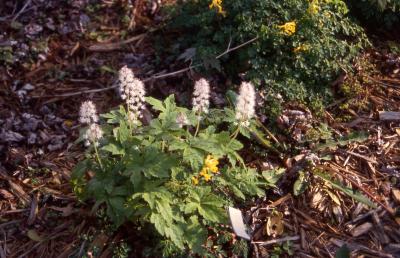Groundcover
Foamflower
Tiarella cordifolia

Foamflower
Features
Spikes of small white flowers in mid to late spring.
Culture
Partial to full shade. Needs a mnoist soil, high in organic matter. Best in acid soils, but will tolerate soil pH as high as 7.
Cultivars
Numerous culitivars have been developed. Check local garden centers to see what is available in your area.
Mature Height
6-12 Inches
USDA Hardiness Zone
3 - 8
Bloom Color
White
Bloom Season
May - June
Soil Conditions
Moist, Well-Drained
Exposure/Light Requirements
Full Shade
Partial Sun/Shade
Foliage Color
Green
Variegated
Pests and Problems
Environmental Damage
Additional pests and problems that may affect this plant:
Slugs are a problem onthis plant.
Additional Notes
Related Resources
Home, Yard & Garden Pest Guide
The Home, Yard & Garden Pest Guide (C1391) provides is written for homeowners and other residents and provides nonchemical and current chemical recommendations for controlling pests associated with trees, shrubs, turf, flowers, groundcovers, vegetables, fruit, and houses. In addition, you'll find detailed information about integrated pest management, pesticide safety, and pesticide application and calibration techniques. This publication may be purchased at your local University of Illinois Extension Unit office, or by calling 800-345-6087, or by placing an order online (search for "C1391").
Visit site >>
Illinois Commercial Landscape and Turfgrass Pest Management Handbook
The Illinois Commercial Landscape and Turfgrass Pest Management Handbook (ICLT) is written for professional applicators and provides nonchemical and current chemical recommendations as well as application timing information for all major pests of turf, woody ornamentals and herbaceous ornamentals. This publication may be purchased at your local University of Illinois Extension Unit office, or by calling 800-345-6087, or by placing an order online (search for "ICLT").
Visit site >>
U of IL - Distance Diagnosis through Digital Imaging
A free plant, weed, insect and disease identification service available through your local University of Illinois Extension office. Center Educators or State Specialists review & respond to information and digital images submitted by local Extension office personnel. Some samples may require further examination or culture work (nominal fee involved) at the U of IL Plant Clinic.
Visit site >>
U of IL - Plant Clinic
Services include plant and insect identification, diagnosis of disease, insect, weed and chemical injury (chemical injury on field crops only), nematode assays, and help with nutrient related problems, as well as recommendations involving these diagnoses. Microscopic examinations, laboratory culturing, virus assays, and nematode assays are some of the techniques used in the clinic.
Visit site >>
